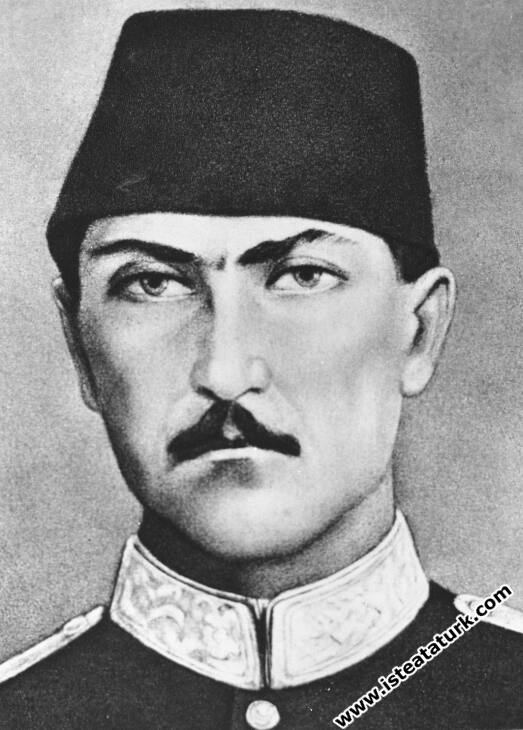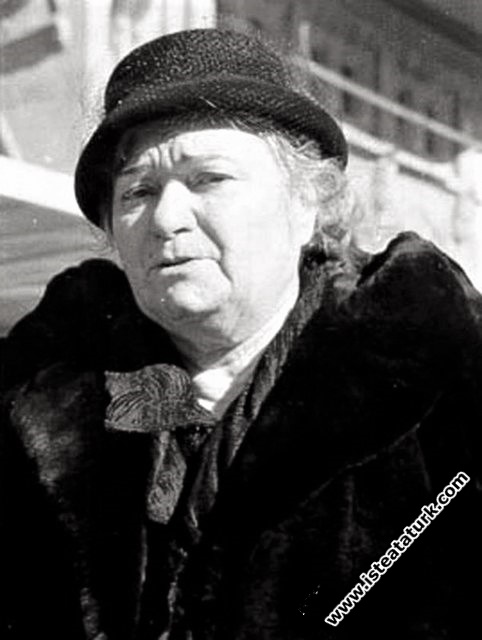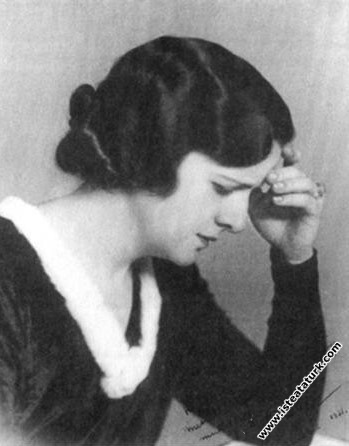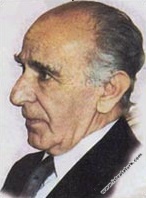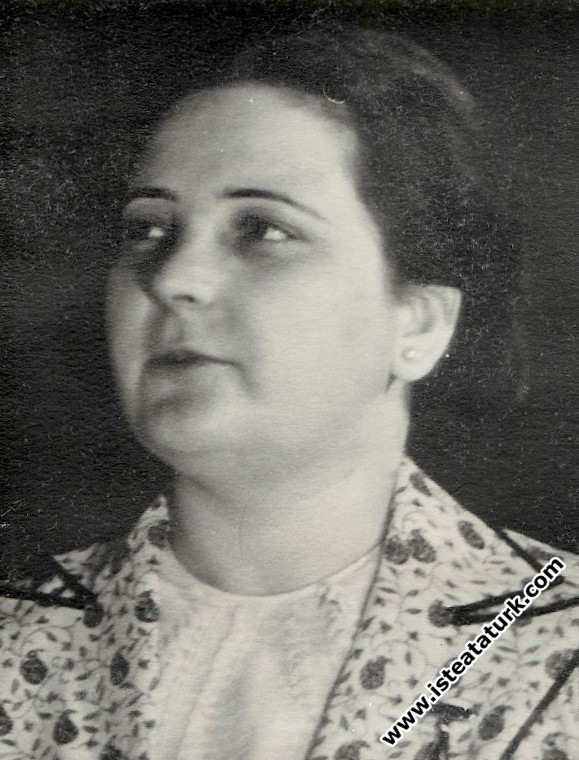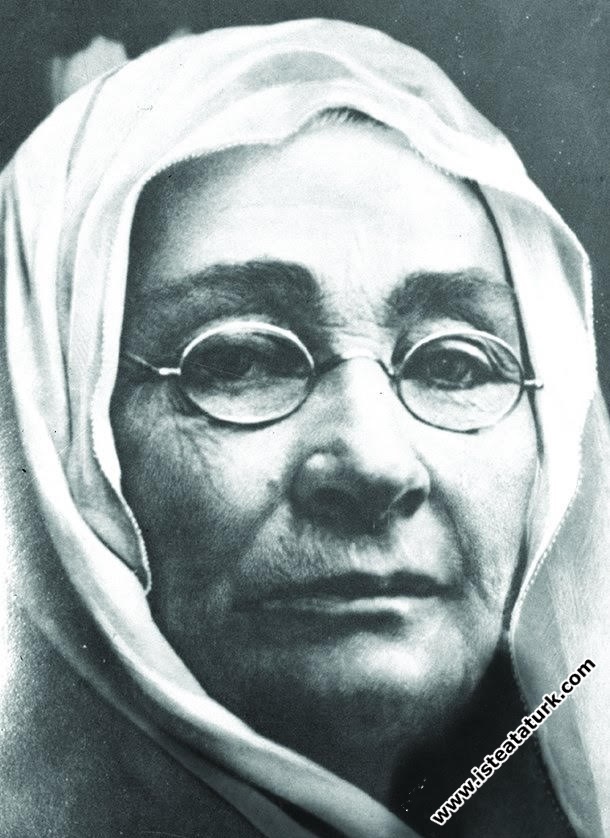
Zübeyde Hanım (1857-1923)
Character Size
The Life of Zübeyde Hanım (1857-1923)
The Life of Zübeyde Hanım (1857-1923)
Atatürk's mother, Zübeyde Hanım, was born in Lankaza in 1857 and spent her childhood and early youth here with her family.
Zübeyde Hanım had a strong body structure as well as a strong will. She wasn't educated enough, but she had learned to read and write. She was called "Zübeyde Molla", just as her mother was called "Mullah Hanım". It was a nickname for his "wise" personality. She was a conservative, traditional woman.
Zübeyde Hanım, who was 13-14 years old when they married Ali Rıza Efendi in 1870, as will be explained below, after her husband died, she returned to the family farm in Lankaza for a while with her children, and later made her second marriage with Ragıp Bey, who was her suitor. She was 36 years old at this time. We know that Zübeyde Hanım went to Istanbul for three or five days to see Mustafa Kemal, who graduated from the Military Academy in 1905 and became a Staff Captain and was imprisoned for a short time, and sent off her son from Sirkeci, who will go to Damascus from there. Later on, Mustafa Kemal Pasha, who made an emotional speech at his mother's grave on January 27, 1923, will tell about this event.
Zübeyde Hanım, who resided in Thessaloniki until the end of the Balkan Wars, believed in her son and helped him with valuable suggestions when Mustafa Kemal was attempting to open a branch of the "Homeland and Freedom Society", which he founded here in Damascus with his friends in 1906. has been. After Thessaloniki was out of our borders at the end of the Balkan Wars, Zübeyde Hanım and her daughter Makbule Hanım came to Istanbul like many Turks. According to the information we have, Ragıp Bey, who is said to have died in Thessaloniki after the First World War, must have passed away just before this migration event. Because, if he was alive, he should have come to Istanbul with his family.
Zübeyde Hanım settled in the house number 76 in Akaretler, in the Beşiktaş district of Istanbul. Together with his daughter, they started a new but troubled life in Istanbul. While Mustafa Kemal Pasha was fighting against the British in the Sinai Front, in the south of Palestine, as the Commander of the Seventh Army, he resigned from his post and went to Aleppo as a result of a disagreement with the Allied German Armies Commander Falkenhein. Wondering about her son, who had a serious "jaundice" disease here, Zübeyde Hanım went to Aleppo with Mustafa Kemal's son, Mustafa Kemal, whom she feared to be blind, by taking Abdürrahim (Tuncok) as an adoptee when he was three years old and left with his mother to raise. He visited Istanbul and returned to Istanbul.
Mustafa Kemal Pasha left the Syrian front on 13 November 1918 and came to Istanbul. Mustafa Kemal Pasha, who went directly to his mother's house, hugged her neck, kissed her hand, and embraced her sister and relieved her longing. It was a happy reunion for the family, who had little reunion in their lives. Mustafa Kemal, who stayed in Pera Palas Hotel for a few days upon his arrival in Istanbul, was a guest at the house of his close friend Salih Fansa in Beyoğlu for a while. Later, Mustafa Kemal, who rented Madam Kasabya's three-storey house in Şişli, took his mother and sister living in Beşiktaş Akaretler with him, and reserved the third floor of the three-storey house for them. He lived on the middle floor and used the room on this floor facing the back garden as his bedroom. He had reserved the great hall as a meeting room. He was staying downstairs. Mustafa Kemal, He held frequent meetings with his friends in this house during the most depressed days of the capital Istanbul, and lived in this house until he went on his journey to Samsun on 16 May 1919. This house in Şişli is now used as a museum.
The days that started with the departure to Samsun will be difficult and painful days for his mother and brother as well as for Mustafa Kemal. Meanwhile, Zübeyde Hanım, who heard the unfounded news that her son Mustafa Kemal "died" and was already sick, became very ill and partially paralyzed. A pleasing event takes place for Ms. Zübeyde in these troubled days. His daughter Makbule marries Mustafa Mecdi Bey, who left the military and went into business. Zübeyde Hanım returns to the house in Akaretler and continues to live here with her daughter and son-in-law.
These painful, troubled but hopeful days will continue throughout the National Struggle. Zübeyde Hanım's illness was increasing day by day. His mother's stay in Istanbul under siege made Mustafa Kemal sad, and he wrote letters to his mother even when he was in the line of fire. Her friends were helping Zübeyde Hanım and fulfilling all her wishes. It is seen in the telegrams sent mutually that Zübeyde Hanım wanted to see her son before she died and that her son also longed to meet his mother as soon as possible.
Mustafa Kemal, who was separated from his mother for three years, decided to bring his mother to Ankara at a time when the War of Independence was approaching. He was the President of the Turkish Grand National Assembly and the Commander-in-Chief. The year was 1922, and it was June. He was going to meet the French writer Claude Farrére, who requested a meeting with him, in Izmit, and his mother would come from Istanbul. Atatürk arrived in Adapazarı on 14 June 1922. They met with Zübeyde Hanım, who had arrived the day before and stayed at the house of Major Baha Bey, the Head of the Military Service, and spent the night in this house. Together, the mother and son returned to Ankara at 20:00 on 24 June 1922 in a car, and went directly to the Çankaya Mansion.
Zübeyde Hanım, who stayed in the mansion with Abdürrahim and Ragıp Bey's niece Fikriye, was getting worse and worse. Zübeyde Hanım, whose pain increased due to partial paralysis and rheumatism, was persuaded to go to İzmir and stay for a while, considering that the weather would be good for İzmir. Another purpose of this trip was to introduce Latife Hanım, whom Mustafa Kemal thought to marry, to Zübeyde Hanım. Chief Adjutant Salih (Bozok) Bey, who went to Izmir to find a suitable place to stay, prepared the Latife Ladies' summer house in Karşıyaka for Zübeyde Hanım.
While she was here, Zübeyde Hanım died on January 14, 1923. She was 66 years old. Gazi Mustafa Kemal Pasha, who had left Ankara on the evening of 14 January 1923 with his special train to go on a long trip in Western Anatolia, arrived in Eskişehir on 15 January. Just before daybreak, Emir called Sergeant Ali, " Is there any news ?" Mustafa Kemal Pasha, looking sadly at Ali Sergeant, replied, " The password has been found, but it has not been solved . " Said. “ I had a dream, I was walking around the green fields with my mother. All of a sudden, a storm came and took my mother away .” When the deciphered telegram was given to him, he read it, closed his eyes, thought for a moment and said, “We are not going to Izmir. Let them turn the train to Izmit,” he said.
On the same day, he sent the following telegram to Chief Aide Salih Bozok in Izmir: “...the heartbreaking news you gave me greatly affected me. Have the deceased perform the ceremony (appropriately the funeral ceremony) in an appropriate manner. May Allah give life and peace to our nation .
Asım Gündüz, a classmate of Atatürk from the War Academy and the Chief of Staff of the Western Front in the War of Independence, was in İzmir at the time of Zübeyde Hanım's death. Asım Gündüz describes the funeral of Zübeyde Hanım as follows:
"Zübeyde Hanım had Latife Hanım, who was with her in her last hours, dictated a will. Latife Hanı first informed the Governor of İzmir, Mustafa Abdülhalik (Renda), about the death of Zübeyde Hanım, and the governor had a big funeral ceremony prepared. Thirty-three people from the well-known hafizes of .
Almost the whole of Izmir participated in the funeral procession. Although there were governors, officers, commanders and teachers, the length of the funeral procession was one kilometer. The wreaths brought by the schools formed a cover over the grave. Western Front Chief of Staff Asım, Kazım (Özalp), Fahrettin (Altay), Mürsel (Baki), İzzettin (Çalışlar), Abdurrahman Nafiz (Gürman) Pashas were walking in front of the funeral procession.
Latife Hanım was dressed in a black coat, covered with a black veil, and wanted to join the funeral procession. But when her family and clergy prevented her from attending the funeral in Islam, she got on a carriage and followed the funeral. Latife Hanım distributed alms to hundreds of silver mecidis in her grave, had mevlut read at her forty, and paid the debt of love and gratitude she felt towards this blessed woman by sending hatims to the poor, just as she made ashura on the night of the 52nd and distributed them to the poor.
Mustafa Kemal Pasha, who wandered around various places for about 12-13 days and followed the state affairs in accordance with his schedule, arrived at İzmir-Karşıyaka station via Manisa on January 27, 1923. He was accompanied by army commanders, ministers, deputies and his aide. İzmir Governor Abdülhalik Renda, Corps Commander Fahrettin Altay and Chief Aide Salih Bozok were among those who welcomed him. Again at the station, a large crowd of people and a car decorated with flowers were waiting for him. He greeted those gathered around him.
He would visit his mother first, just as he had visited his mother first in his health. He gave a touching and concise speech at his mother's grave that day. In his speech, as in his upbringing. He expressed the pain and sacrifice of his mother, who was always on his way during the years of the National Struggle. While expressing the troubles and pain he suffered because of himself, he also expressed his appreciation for his mother.
Atatürk was deeply excited that day. He gave his most sincere and emotional speech at his mother's grave that day. Zübeyde Hanım was a devoted mother. She had made unprecedented efforts in the upbringing of her son. She had longed for her son for years, finally she died shortly after seeing his triumph.
Mustafa Kemal Pasha, while putting his life and all his assets to save his nation, could not take care of his mother enough. It was these feelings that made him shed tears and tell his deepest feelings when he visited his mother's grave for the first time with a large group. In his speech here, Mustafa Kemal Pasha, briefly talking about his mother's troubles, said:
“... I am undoubtedly deeply saddened by the loss of Valdem. But there is one thing that relieves me of this sadness and brings me consolation, and that is to see that the administration that destroyed and destroyed our motherland has been taken to the grave, never to return to it again. Valdem is under this ground, but may the National Sovereignty stand forever. This is the greatest strength that consoles me. Yes, Hakimiyet-i Milliye will continue forever. Let me repeat the oath of conscience that I have committed to the spirit of Valdem and the spirit of all ancestors. I swear and make my vow in front of Valdem's mausoleum and in the presence of Allah, I will never hesitate to go to Valdem if it is necessary for the protection and defense of the nation's production and domination by shedding so much blood. Let it be a debt of conscience and honor for me to give my life for the National Sovereignty.”
Mustafa Kemal's speech was instrumental in the hearty cheers of the people of Karşıyaka, and the people applauded him like crazy and shouted, " Long live my pasha...Long live you ...".
Expressing his devotion to Ms. Zübeyde by saying, " My mother and sister, whose virtue and high womanhood I believe in, believed in and served me in the revolutionary works," Mustafa Kemal Pasha loved his mother very much. When she heard a song her mother loved, her eyes would tear up. Every morning when he woke up, he would do his cleaning, after getting dressed, he would send a message to his mother for a visit and ask for permission. Zübeyde Hanım would accept her son after she had prepared in the same way. In these meetings, Mustafa Kemal Pasha would kiss his mother's hand and receive her blessing. They would stay and chat with their mother for a while.
Zübeyde Hanım addresses her son as "Mustafam" or "Yellow Mustafam" ; most of the time, he would find it rare, addressing or mentioning it as "Paşam" or " Sarı Paşam ".
Cevat Abbas Gürer, one of Atatürk's aides-de-camps, who was with him for most of his life, said, "Atatürk's mother, whom he loved and respected very much, and his situation in terms of decency and intelligence," said the "Turkish Mother" who gave birth and raised a national hero, "state education and training". How beautifully he reveals his virtue:
Mrs. Zübeyde was very interested in every situation of her son, who was orphaned at a young age. Because it was a great factor in his upbringing and being useful to the country after he grew up. She had literally been both mother and father to Atatürk.
When she learned that her beloved son Mustafa was sentenced to death, Ms. Zübeyde, who was stricken with sadness despite being extremely vigorous, fell ill and fell into bed. The fact that he could not get accurate information from his son for a long time also caused the disease to progress.
Although Çankaya is now living a very happy and happy life that she has given Ms. Zübeyde the opportunity to see and smell her precious and beloved son, she often spends her time in sickness.
It would take a long time to describe Ms. Zübeyde's creation, intelligence and behavior towards her environment. It was a duty for Atatürk not only to be a mother, but to visit this dignified, serious, high-minded great Turkish woman every day. Visits were not made without communication. Because mother and son would not see each other without preparation. The main rule of the relationship between the two was that Atatürk always be the visitor.
As soon as the Eternal Chief woke up in the morning, if he was going to see his mother that day, he would get permission from someone through his mother. Then Atatürk was prepared as if he were going to attend a big ceremony.
Ms. Zübeyde was also preparing to accept Atatürk with great care, even in her sickbed. She combed her hair, covered her embroidered headscarf, and wore a silk gown over her embroidered crepe shirt, which was left from the Macedonian wedding dress girl's rich dowry. And after completing her Istanbulkari colored mashlah and formal attire, she would send the news that she was expecting her son.
Mrs. Zübeyde used to address Atatürk as 'Mustafa'. For years, I have been involved in the privilege of gaining security, trust and affection among this big family. I was often present at the meetings of both elders together.
My eyes that gather together the happiness of raising a great, precious child and the pride of having a precious great mother; yes, I was getting emotional and happy when I saw live examples of how deep and deep-rooted, how decent and serious and how sincere the upbringing in Turkish society and its foundations are. I can say that Mrs. Zübeyde and Atatürk were in love with this mother and son.
This mother started with lullabies that instilled in her son the love of homeland and nation when he was just a cradle child, raised him with feelings in every age, directed him to education, and instilled knowledge and wisdom. He, Mustafa Kemal, had made his son, the savior who had grown up and found his rank.
During each of these visits, Atatürk kissed his mother's blessed hand with great respect. Then that big man would shrink in front of his mother, he would become Mustafa, even Mustafacik. Their conversations, their jokes, were signs of simmering love.
I will present a situation that I witnessed in one of these mother-son meetings in Çankaya as an example of Ms. Zübeyde's fast-paced intelligence, whose value is unlimited:
"Atatürk kissed his mother's hand. Ms. Zübeyde wanted to embrace Atatürk with all the expression of her enthusiasm gathered in her eyes as she extended her hand to her son. After embracing him, she should have been proud to be the mother who gave a unique savior gift to the saintly Turkish nation. The great Turkish mother, who read, reached for the hand of her liver, which was moving away in her arms:
Atatürk said : "What are you doing mommy"...
Ms. Zübeyde quietly and with absolute seriousness: "I am your mother, you are doing your duty to me by kissing my hand; but you are a head of state who saved the homeland and nation. I am also a member of this holy nation and its subject, I can kiss your hand." She gave the answer."
" Rather than kissing her son's hand, Ms. Zubeyde was pointing to those around her that her son's office was worthy of the greatest respect with her gesture. "
Dr. Ali Güler
Source: 1- ATATÜRK ARAŞTIRMA MERKEZİ DERGİSİ, Sayı: 45, Cilt: XV, Kasım 1999
2- Atatürk’ten Anılar, Kemal Arıburnu, İnkılap Kitapevi 1998. ISBN: 975-10-1392-5. Sayfa: 53. (Cevat Abbas Gürer, Atatürk’ün Zengin Tarihinden Birkaç Yaprak, 1939. Sayfa:161-162)
